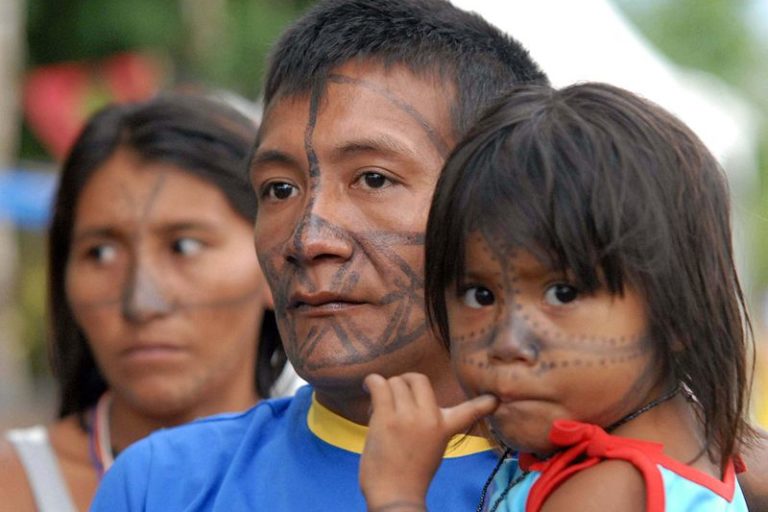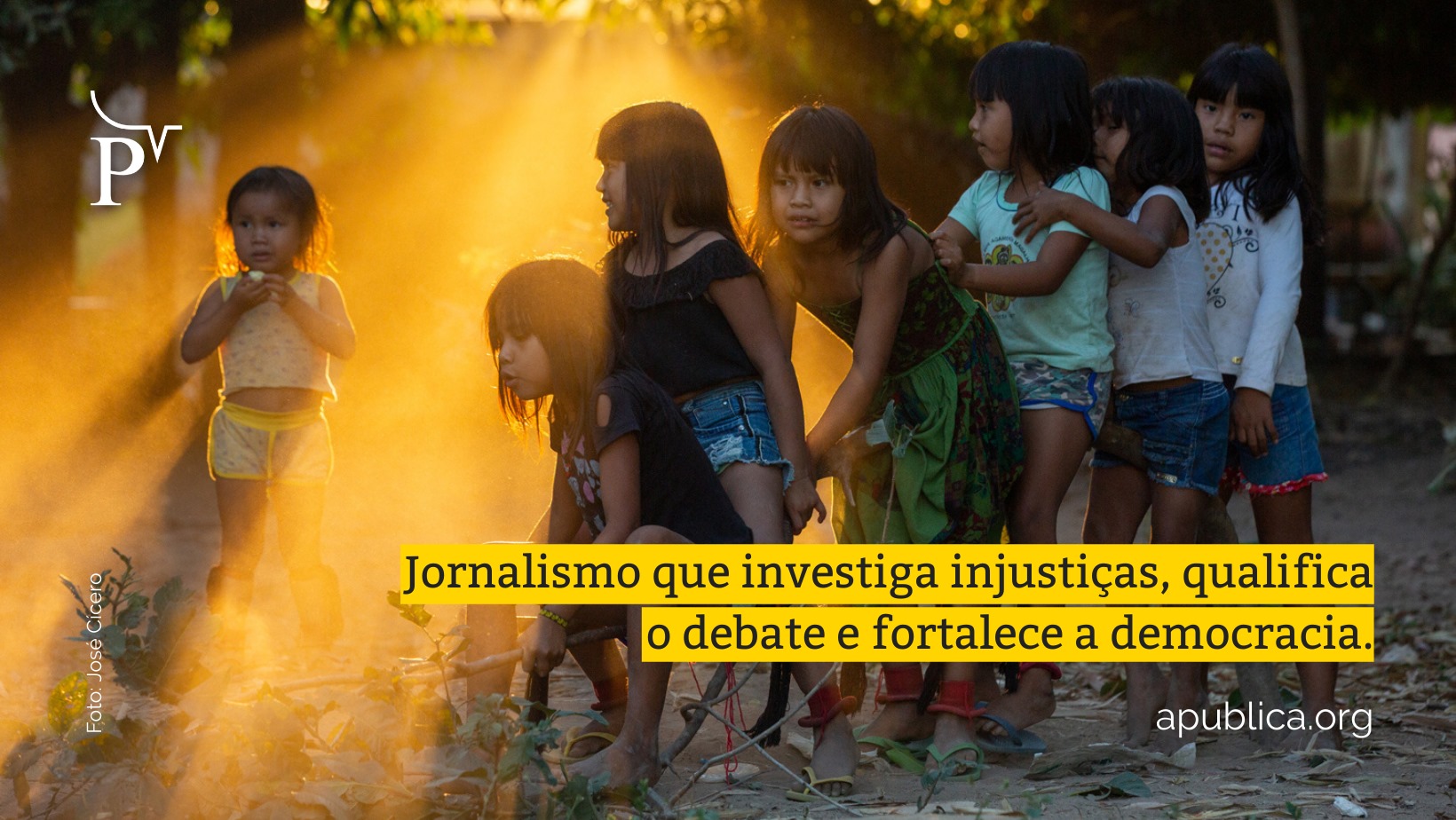The anthropologist Eduardo Viveiros de Castro discusses indigenous resistance in the Amazon, the indigenous leader Raoni Metuktire, and his pessimism about the climate crisis
Translated by Tom Gatehouse. You can read the original, longer interview, (in Portuguese) here.
This is the third in a series of articles written and published in Portuguese by Agência Pública, São Paulo and translated and published in English by LAB.
Eduardo Viveiros de Castro, one of the world’s most influential anthropologists and ethnologists, invited Agência Pública to his Rio de Janeiro apartment at the end of 2019. The interview, which lasted for over two hours, is the first he has agreed to since the election of Jair Bolsonaro – and it was with some reluctance.
‘I don’t have any particularly original or profound ideas about what’s happening. I’m just as perplexed as everybody else,’ he says, describing the current situation as ‘a moment in which words have lost their power, even their value. We can’t tell the difference between truth and lies anymore.’ He feels the truth has become unbelievable.
During the interview, the distinguished anthropologist touched on various, interconnected issues of the day – climate change, the destruction of the Amazon and indigenous resistance, the role of indigenous leader Raoni Metuktire, land reform, the Bolsonaro administration and fake news.
The world without us
Agência Pública:The anthropologist Claude Lévi-Strauss, whom you admire, once wrote: ‘I want a little more respect for the world, which began without the human race and will certainly end without it. This is something we should always be aware of’. To what extent can this be applied to the present?
EVdC: That quotation is from a book published in 1955, Tristes Tropiques, which is perhaps his best-known work outside his more specialised anthropology. It’s interesting, because in a sense it’s a banal observation – the world began without man and will end without him – but at the same time it’s something that needs to be remembered.
First, because the forgetting of this fact forms the basis on which people so often build their lives; secondly, because this observation from fifty or sixty years ago has acquired a resonance today which is unexpected to an extent.
Yes, Lévi-Strauss was already warning us that the advance of so-called Western civilization necessarily involved the destruction of the material conditions of its own existence, which means this civilizational project is suicide. But now we have the impression that the end is approaching faster than we had imagined.
That said, the idea that the current climate crisis necessarily implies the disappearance of humanity is an exaggeration. It’s unlikely that the entire species will disappear, though conditions will probably become much tougher than they have been in the last 10,000 years, which is as much history as we have.
These conditions will very likely cause a demographic shock. We don’t know how and when, nor what it will entail. So the Lévi-Strauss quotation is very much a gloomy one, because it’s taken on an urgency which perhaps it didn’t have in 1955. Maybe it’s no longer ‘It will end’, but ‘It is ending’.
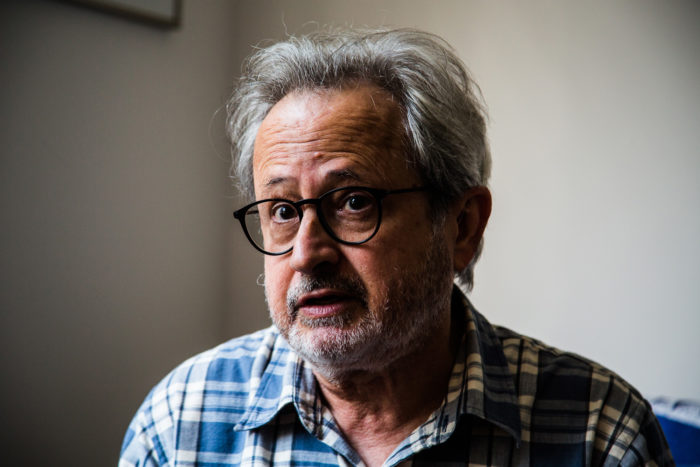
AP: In interviews, you’ve declared yourself a pessimist. During your career, have there been times when you’ve felt less pessimistic? How would you characterise yourself today?
EVdC: I think I’m a pessimist, yes, on various levels. Like Lévi-Strauss, I’m pessimistic in that I think humanity is complicit in its own extinction, given that the representatives of the species who consider themselves most advanced are precisely those who are contributing most radically to the deterioration of the material conditions humanity needs for its survival.
I’m also pessimistic in the sense that I have little hope that nation states and governments around the world are capable of the radical change which is required of the advanced societies – particularly technologically advanced societies – to slow down the deterioration of the Earth’s thermodynamic system.
Collective rationality
EVdC: I don’t have much faith there’ll be a movement from individual rationality – that is, the individual capacity to perceive that things are heading in the wrong direction – to a collective rationality, resulting in measures which would mean a drastic change to the way of life which we consider as the ideal, even though it’s destroying the planet.
Brazil is also a great source of pessimism for me. We’ve never settled the score with the dictatorship; it’s a disgrace that Brazil hasn’t done what Argentina and Chile have. Ever since the declaration of independence, we’ve lived in a guided democracy, ‘permitted’ by the military to a certain extent. This is pathetic – we went from being under the control of a foreign monarchy, to being a republic guided by the military.
Brazil continues to function according to one way of being, thinking, and acting, which harks back to slavery. The relationship of government with the poor and black populations, the enthusiastic genocide being perpetuated by the politicians.
You have to call in a psychoanalyst to do political analysis in Brazil today
We’ve got to the point where you have to use the language of psychopathology to talk about the people in government. ‘The governor [of the state of Rio de Janeiro, Wilson Witzel] is a psychopath!’, ‘The president is mad’, stuff like this. You have to call in a psychoanalyst to do political analysis in Brazil today.
I admit it, I’m not an optimist, but I do think that when it comes to politics, we’re worse now than we’ve ever been. The situation is truly surreal. I recently made a joke on social media, saying that the success of fake news in Brazil lies in the fact that the truth has become unbelievable. The true news is unbelievable, so you believe in the lies.
Scared of the Indians?
AP: The Bolsonaro administration has identified the Amazon and the indigenous people as its enemies. Why is this government so scared of the Indians?
EVdC: For this government and the sections of society that it represents – in particular, big capital and agribusiness – the problem of the Indians is that the land they inhabit exists outside the land market. The project of this government is to privatize, if possible, the whole country.
They are targeting national parks, nature reserves, any land which has special use. It’s using the Ministry of the Environment to destroy the system of protected lands and attack the indigenous people. This expresses a desire to turn the whole country into private property. They want to remove from the State effective sovereignty over its territory, or rather, transform sovereignty into just a kind of supervisory power, which delivers land to private capital, whether national or foreign.
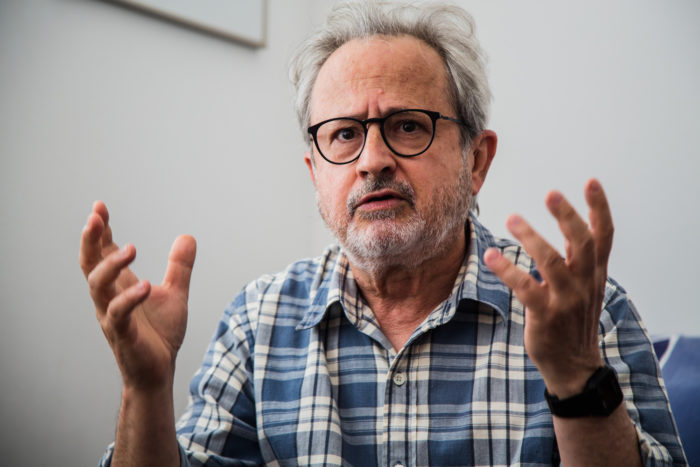
The second reason is the belief that Brazil is essentially a European country; that Europe constitutes the best of our formation, our history. There’s hatred towards non-whites in Brazil. There’s anti-black racism, and a double racism with a territorial element towards the Indians.
These are the main reasons in my opinion.
AP: One feature of this government which seems new is the narrative of the 21st century Indian.
EVdC: I think we’re witnessing a kind of final offensive against the indigenous peoples. This is the big push, and it’s happening on all fronts. If they’re not buying them out, they’re sending in missionaries to break them, prohibiting pajelança [traditional medical and religious systems], accusing the Indians of the craziest things, doing whatever it takes. Because Indians aren’t saints. No-one is.
To begin with, there are more than three hundred indigenous populations in Brazil. To call them all ‘indigenous’ doesn’t tell us much about them; it says a lot more about the Brazilian Constitution, about the law. So ‘Indian’ is really a form of relationship with the State.
The Amazon is the part of Brazil that represents what Brazil was in 1500 in its entirety. I’m not saying it’s the same, not at all. But it’s the part that has yet to be destroyed, ‘civilized’, ‘conquered’.
Of course, there’s a historical dimension to it. They are the surviving descendants of pre-Columbian communities; they see themselves as linked to these communities. They also stand slightly apart from the national state and the dominant race and have a very particular relationship with them. This is conditioned principally by their relationship with the land.
This is the heart of the matter. The Amazon is the part of Brazil that represents what Brazil was in 1500 in its entirety. I’m not saying it’s the same, not at all. But it’s the part that has yet to be destroyed, ‘civilized’, ‘conquered’. So now the feeling is that we have to finish the job that was started in 1500.
A colony for the export of commodities
AP: You’ve touched on indigenous leadership – that there’s no-one who speaks for all of them – but there’s the figure of Raoni Metuktire, for example. Could you talk about his role in present indigenous resistance? And what about land reform?
EVdC: Land reform is particularly important. Brazil has never carried out land reform and everything that happens here can partly be explained by that. We chose to throw the rural populations upon the cities and hand over the countryside to mechanized, intensive agriculture.
What’s different about the Amazon is that there is still a large section of this traditional population, the ribeirinhos [traditional riverine people]. I don’t know what’s going to happen to them, because the soy industry got a foothold in the Amazon some time ago.
The economic frontier is advancing, and as it does so it expels people, cuts down trees, and puts cattle in their place – there are more cows in Brazil than people. Clearly, all these cows aren’t just for domestic consumption. It’s true, we’re feeding the world. It’s funny, I often see how proud people in government are of this fact.
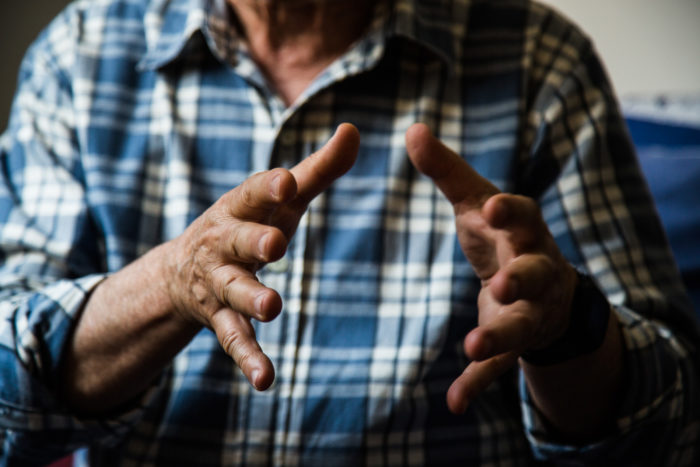
We are destroying Brazil, exporting water, exporting soil. And are we any better off as a result? Has inequality fallen, after years of destroying the Cerrado, the Amazon? We’re in the same position we were in 1500. We’re a colony for the export of commodities. Brazil remains a colony, which has achieved the feat of being a self-colony – a colony of others and a colony of itself.
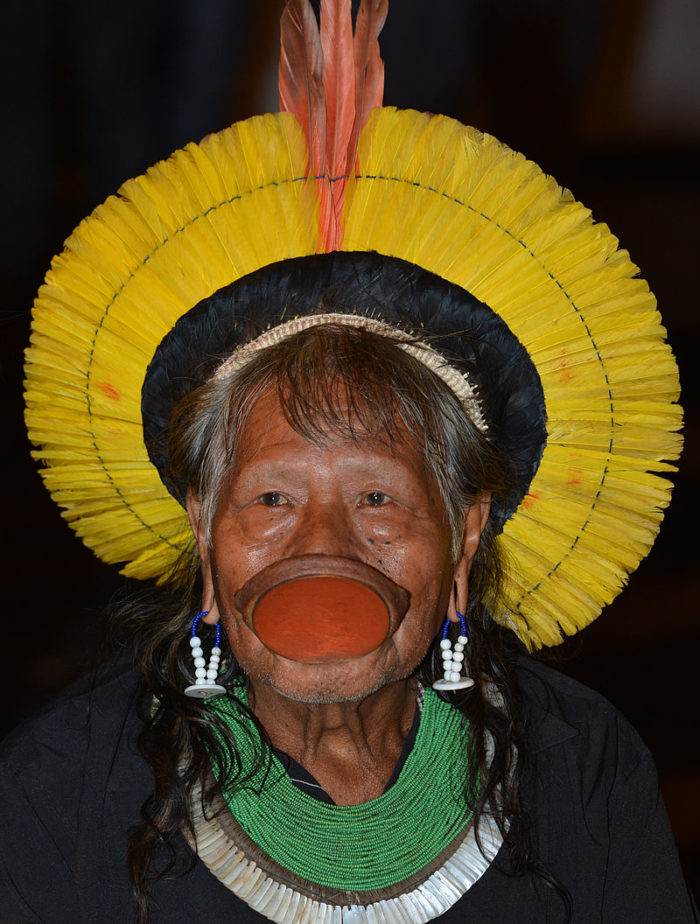
With regard to Raoni, it’s true he’s become a symbol capable of inspiring the indigenous struggle. But above all, he’s a symbol for outsiders, for the non-indigenous. Partly this is because of his striking appearance, partly because he’s an old man. He’s been fighting for a long time, literally. And the Indians now find themselves obliged to build alliances and make common cause.
Brazil’s indigenous societies have always had great anarchic potential. They had no need to produce pyramidal political systems with a main leader. This is reflected in their instinctive resistance to anyone who speaks on behalf of the collective. But that’s exactly what they need at the moment – people who can speak on their behalf against this ethnocidal state.
It’s true, the Indians are in a complicated situation. They have to produce leaders, supra-ethnic ones. Raoni, for example, is from the Kayapó people, but he doesn’t speak on their behalf. He speaks on behalf of all indigenous peoples, which quite antithetical to indigenous political sensibility. But this is something they’ll have to negotiate. They have no choice, because they’re facing an enemy who obliges them to unite. They’re only united because of the whites.
It’s the Indians who are protecting the Amazon from the destructive force of agribusiness, from big capital, and from these deranged military men who want to turn Brazil into a desert, who think that’s what the task of government is.
We have to ‘undevelop’
AP: You’ve said that we should ask the Indians about the end of the world, since their world has been ending since 1500. What concrete lessons can the indigenous people give us in this sense?
EVdC: Obviously, the seven billion humans who inhabit planet Earth can’t live like a community of 500 people in the Amazon. But the indigenous peoples – in the whole world, not just Brazil – have a relationship with the rest of reality, particularly biological reality – other living beings – very different to that implicit in our way of life and explicit in various religious and philosophical doctrines.
These populations see themselves as part of a universe in which they’re on the same level as other beings, subject to the same metaphysical conditions of existence. Because of their different historical experience, traditional populations don’t see themselves as superior to other creatures. They might think that men are more intelligent than alligators, but they don’t believe that’s a qualitative difference, a difference in nature.
We have the feeling that we’re gifted with something which will save us from any problem; that other species will become extinct, but not ours – when we know that’s not the case.
But for us, it is. This is hypocrisy. In Western modernity, man considers himself an exceptional creature. He’s an animal, but he has something that the animals don’t. This used to be called the soul, now it’s culture, science, technology. It’s as if this extra-animal quality cancelled out or freed us from our terrestrial immanence – it transcends material reality. We have the feeling that we’re gifted with something which will save us from any problem; that other species will become extinct, but not ours – when we know that’s not the case.
It’s as if the human species were the only animal which, because it knows itself to be an animal, isn’t an animal. Which is a contradiction in terms. The knowledge that we’re animals should make us more heedful of the conditions that link us to other animals; that is, the need for a tolerable environment.
AP: You’ve even said that the human species is committing suicide.
When we say ‘species’ we need to be careful, because nine times out of ten we’re talking about super-developed countries, the super-developed way of life.
That’s another phrase I like to use: super-development. What we call a ‘developed country’ is really super-developed, in the sense that it consumes far more than necessary, far more than is reasonable, and far more than is possible given the material conditions of the planet.
These countries have to ‘undevelop’ so that other countries, other peoples, can develop a little more, so we can have more equality in our conditions of existence. Because if this doesn’t happen, the planet will explode. Brazil is a country being used by the global economic system to conduct a scientific experiment, which is the following: how much can you screw over a population without generating bloody insurrection? To what extent can you withdraw people’s rights, abuse them, exploit them, expropriate them, kill them, throw them into informality, without there being a riot, a revolution, an explosion of popular violence?
Main image: An indigenous family in Brazil from the Tucuxi group. Image by Fábio Rodrigues Pozzebom / ABr CC BY 3.0 br.

